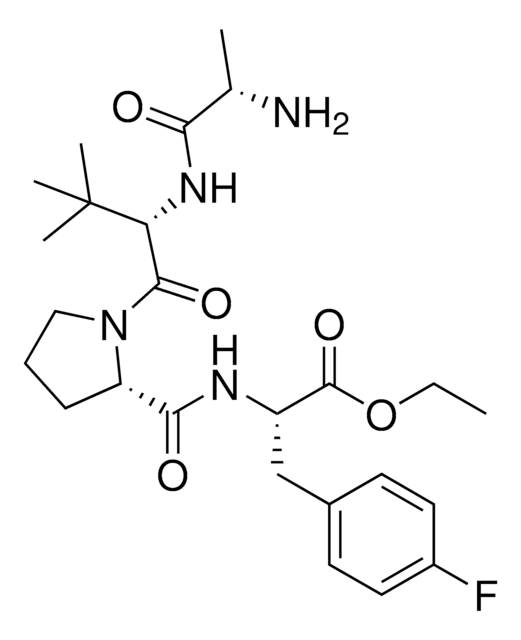Wichtige Dokumente
917206
A1V2PF1-NHEt-C10-NH2
Synonym(e):
(S)-1-((S)-2-((S)-2-((10-Aminodecyl)amino)propanamido)-2-cyclohexylacetyl)-N-((S)-1-(ethylamino)-1-oxo-3-phenylpropan-2-yl)pyrrolidine-2-carboxamide, AVP conjugate for IAP-mediated protein degrader development, SNIPER building block
About This Item
Empfohlene Produkte
ligand
A1V2PF1
Qualitätsniveau
Form
crystals
Eignung der Reaktion
reactivity: carboxyl reactive
reagent type: ligand-linker conjugate
Funktionelle Gruppe
amine
Lagertemp.
2-8°C
SMILES String
C[C@H](NCCCCCCCCCCN)C(N[C@H](C(N1CCC[C@H]1C(N[C@H](C(NCC)=O)CC2=CC=C(C=C2)F)=O)=O)C3CCCCC3)=O
Anwendung
Building blocks in this series:
917222 A1V2PF1-NHEt
916943 A1V2PF1-NHEt-C6-NH2
917206 A1V2PF1-NHEt-C10-NH2
917451 A1V2PF1-NHEt-PEG1-NH2
917702 A1V2PF1-NHEt-PEG3-NH2
Technology Spotlight: Degrader Building Blocks with Inhibitor of Apoptosis Protein (IAP) In Silico-Derived Ligands
Sonstige Hinweise
Rechtliche Hinweise
Ähnliches Produkt
Lagerklassenschlüssel
11 - Combustible Solids
WGK
WGK 3
Flammpunkt (°F)
Not applicable
Flammpunkt (°C)
Not applicable
Hier finden Sie alle aktuellen Versionen:
Analysenzertifikate (COA)
Leider sind derzeit keine COAs für dieses Produkt online verfügbar.
Wenn Sie Hilfe benötigen, wenden Sie sich bitte an Kundensupport
Besitzen Sie dieses Produkt bereits?
In der Dokumentenbibliothek finden Sie die Dokumentation zu den Produkten, die Sie kürzlich erworben haben.
Unser Team von Wissenschaftlern verfügt über Erfahrung in allen Forschungsbereichen einschließlich Life Science, Materialwissenschaften, chemischer Synthese, Chromatographie, Analytik und vielen mehr..
Setzen Sie sich mit dem technischen Dienst in Verbindung.








